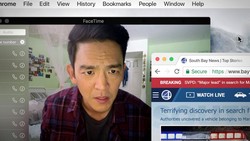Like many parents around the globe, my father is the worst with technology.
When he’s on a computer keyboard, he types words out letter by letter with a single index finger.
Before he got cataracts, my dad would wear three pairs of reading glasses just to see what keys he jabbed at.
Let’s just say his emails were unreadable at times.
Speaking of emails, he still doesn’t know what our family email address is; even though we’ve had the account for a decade.
The man should just get it tattooed on his arm instead of calling me daily about it!
I’m not sure how my dad would fair in David Kim’s position.
David Kim, played by John Cho, is a widowed father with a daughter, Margot.
After his 16-year-old daughter has gone missing for 36 hours, David contacts the local authorities to help find her.
While they conduct their own investigation, David attempts to find clues of her whereabouts by going through his daughter’s laptop.
The entire thriller is viewed through the technology we use daily like laptops and phones.
Director Aneesh Chaganty takes a risk with this style, but successfully makes Searching an exciting thriller with a modern twist.
In 2014, director Leo Gabriadze took a similar risk with his cyber horror flick, Unfriended. The low-budget scary movie was shot entirely through a laptop screen and followed a hour-and-a-half long Skype conversation.
There were no breaks or time lapses. Unfriended was surprisingly spooky and had a good message; but most importantly, it laid the foundation for Searching.
Chaganty takes Gabriadze’s concept to the next level by progressing the story over days and finding innovative ways to take the story beyond the room where the laptop sits.
It’s not like we’re watching David chilling in his pajamas in bed, poking around to find some juicy recipes that his daughter left on Pinterest; David explores an array of websites and social media through different mediums to go further than the investigation’s scope.
While uncovering his daughter’s life on social media, it provokes a question for David: does he really know his daughter?
On the outside, Margot has a smile on her face and is always down to watch The Voice on Tuesday nights. However, on social media, Margot is a different person.
 David’s daughter is more open about her life on social media by sharing how upset she is over the loss of her mother. This is a common gap between parents and their children today.
David’s daughter is more open about her life on social media by sharing how upset she is over the loss of her mother. This is a common gap between parents and their children today.
Instead of talking at the dinner table every night, we’re expressing ourselves through our passive Tumblr posts.
Another glaring issue which Chaganty covers is the overbearingly fake outpouring of love that people express on social media when someone is gone, even though they weren’t valued in the first place
At school, Margot didn’t have any friends. Then, when Margot disappears, everyone suddenly misses their “best friend.”
This is a testament to how far people will go for attention on social media.
Sure, there are the foodies who eat up the likes when they post a filtered photo of a Starbucks caramel macchiato in their hand; but disgustingly, folks will try at all costs to receive likes on Facebook, even if it’s at the cost of another’s life.
By bringing this thriller into the modern age, Chaganty eloquently addresses these themes.
If you watch a suspenseful movie from 20 years ago, characters may have faced their modern day dilemmas like batteries dying on a walkman.
Today, the Internet and social media are aspects of our lives we can’t go without.
David can’t go without it either because if not, he wouldn’t have the clues to track Margot or become closer to her in a way.
My dad on the other hand, he could go without it.
That is, until he needs the email address.
PHOTO TAKEN from The Hollywood Reporter
PHOTO TAKEN from images.everyeye.it



